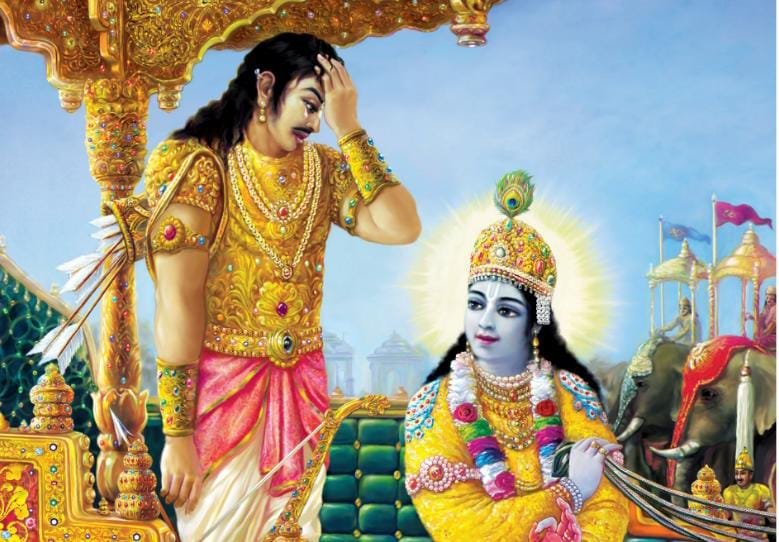(Image courtesy krishna.org)
Attachments Deviate A Person From The Path of Dharma
किं नो राज्येन गोविन्द किं भोगैर्जीवितेन वा
येषामर्थे काङ्क्षितं नो राज्यं भोगा: सुखानि च || 32||
त इमेऽवस्थिता युद्धे प्राणांस्त्यक्त्वा धनानि च
आचार्या: पितर: पुत्रास्तथैव च पितामहा: ||33||
मातुला: श्वशुरा: पौत्रा: श्याला: सम्बन्धिनस्तथा
एतान्न हन्तुमिच्छामि घ्नतोऽपि मधुसूदन || 34||
अपि त्रैलोक्यराज्यस्य हेतो: किं नु महीकृते
निहत्य धार्तराष्ट्रान्न: का प्रीति: स्याज्जनार्दन || 35||
kim no rajyena govinda kim bhogair jivitena va
yesam arthe kanksitam no rajyam bhogah sukhani cha|
| 32||
ta ime ‘vasthita yuddhe pranams tyaktva dhanani cha
acaryah pitarah putras tathaiva ca pitamahah ||1.33||
matulah svasurah pautrah syalah sambandhinas tatha
etan na hantum icchami ghnato ‘pi Madhusudana || 1.34||
api trailokya-rajyasya hetoh kim nu mahi-krte
nihatya dhartarastran nah ka pritih syaj janardana || 1.35||
Shloka Translation
BG – Ch. 1- Ver. 32 – 35:
O Krishna I have no desire for victory, pleasures, or the kingdom, O Govinda, what is the worth of the kingdom, pleasure, or life itself? Those for whom we seek kingship, pleasure, and happiness are present in war, willing to forego their desire for life and money.
There are teachers, uncles, fathers, sons, grand-uncles, maternal uncles, fathers-in-law, brothers-in-law, and other relatives present. I don’t want to attack them, O Madhusudana, even though they want to kill me. When I won’t do it even if it meant winning all three worlds, how can I do it to win just this earth?
Explanation
Arjuna’s strong devotion for his community and family members is on display here, thanks in part to his inherent compassion. As a result, he is unwilling to fight. Taking someone’s life is wrong in itself, but killing a relative is even more so. Arjun was torn: what would he gain from a victory attained by such a horrible act? It would bring him no joy because he would have lost all of his loved ones.
Even though Arjuna’s views were moral and noble, they were not spiritual. They were sprouting out of compassion and attachment with his relatives. He was confused, disillusioned, and losing control of his body and mind.
Arjuna was depressed to the point of suicidal depression, especially as he questioned the value of life itself. Arjuna continues his fall into illusion by reasoning why it is pointless to live or carry out the mission he had agreed to carry out. His mind confused up his relationships with his Dharma.
Verse & What we can learn
When thoughts and emotions are influenced by attachment one gets deviated from the path of Dharma.
Attachment with people & possessions leads to sorrow and depression.
Mindfulness Meditation helps in balancing emotions and having the right perspective towards any situation by following the path of Dharma.
In the next verse, we will know how Arjuna continues to speak his thoughts having been overcome by sorrow.
Let’s learn to live with “The Gita” via Meditation Affinity…
